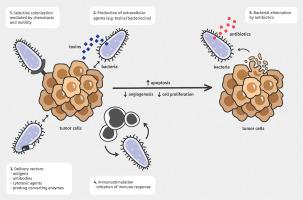Life Sciences ( IF 5.2 ) Pub Date : 2020-08-19 , DOI: 10.1016/j.lfs.2020.118296 Mateusz Dróżdż 1 , Sebastian Makuch 2 , Gabriela Cieniuch 1 , Marta Woźniak 2 , Piotr Ziółkowski 2

|
Traditional methods for cancer therapy, including radiotherapy, chemotherapy, and immunotherapy are characterized by inherent limitations. Bacteria-mediated tumor therapy is becoming a promising approach in cancer treatment due to the ability of obligate or facultative anaerobic microorganisms to penetrate and proliferate in hypoxic regions of tumors. It is widely known that anaerobic bacteria cause the regression of tumors and inhibition of metastasis through a variety of mechanisms, including toxin production, anaerobic lifestyle and synergy with anti-cancer drugs. These features have the potential to be used as a supplement to conventional cancer treatment. To the best of our knowledge, no reports have been published regarding the most common tumor-targeting bacterial agents with special consideration of obligate anaerobes (such as Clostridium sp., Bifidobacterium sp.) and facultative anaerobes (including Salmonella sp., Listeria monocytogenes, Lactobacillus sp., Escherichia coli, Corynebacterium diphtheriae and Pseudomonas sp). In this review, we summarize the latest literature on the role of these bacteria in cancer treatment.
中文翻译:

专性和兼性厌氧细菌在靶向癌症治疗中的应用:当前策略和临床应用。
传统的癌症治疗方法,包括放射疗法,化学疗法和免疫疗法,具有固有的局限性。细菌介导的肿瘤治疗由于专性或兼性厌氧微生物能够渗透并在肿瘤的低氧区域中增殖而成为一种有前途的癌症治疗方法。众所周知,厌氧细菌通过多种机制导致肿瘤消退和转移抑制,包括毒素产生,厌氧生活方式和与抗癌药的协同作用。这些特征有可能被用作常规癌症治疗的补充。据我们所知,尚未发表有关专门考虑专性厌氧菌(例如梭菌属,双歧杆菌属)和兼性厌氧菌(包括沙门氏菌属,单核细胞增生李斯特菌,乳杆菌属,大肠杆菌,白喉棒状杆菌和假单胞菌属)。在这篇综述中,我们总结了有关这些细菌在癌症治疗中作用的最新文献。































 京公网安备 11010802027423号
京公网安备 11010802027423号